五外研版(一年级起点)小学英语五年级上册知识点归纳总结
文档属性
| 名称 | 五外研版(一年级起点)小学英语五年级上册知识点归纳总结 | 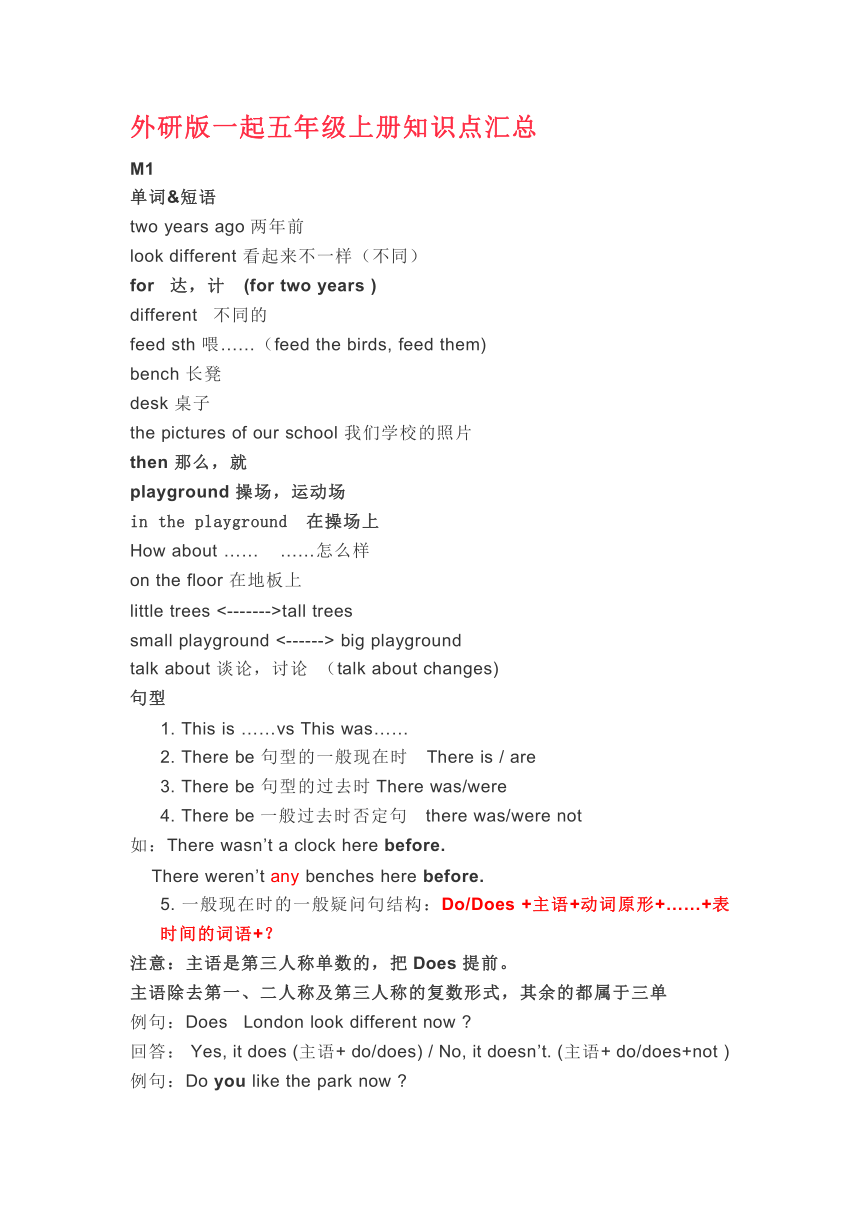 | |
| 格式 | zip | ||
| 文件大小 | 30.1KB | ||
| 资源类型 | 教案 | ||
| 版本资源 | 外研版(一年级起点) | ||
| 科目 | 英语 | ||
| 更新时间 | 2019-01-07 13:32:14 | ||
图片预览

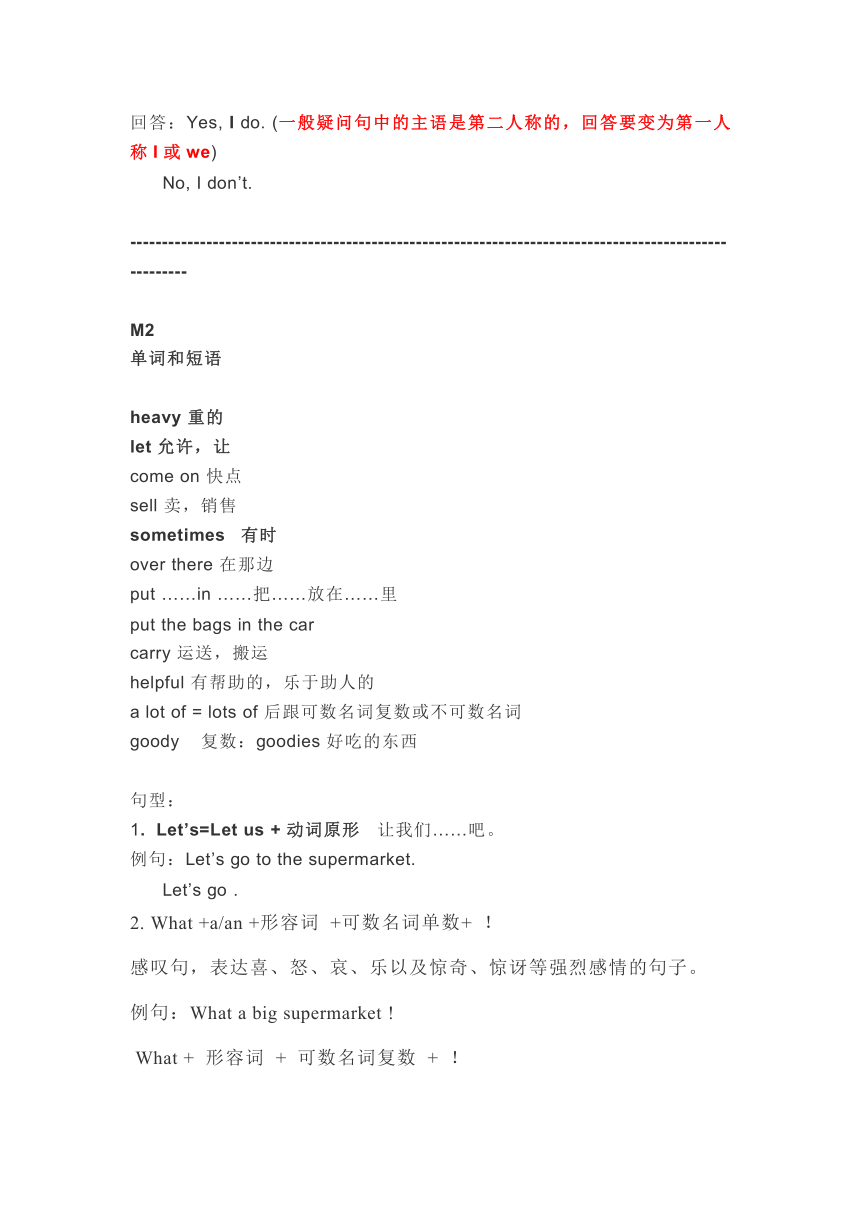
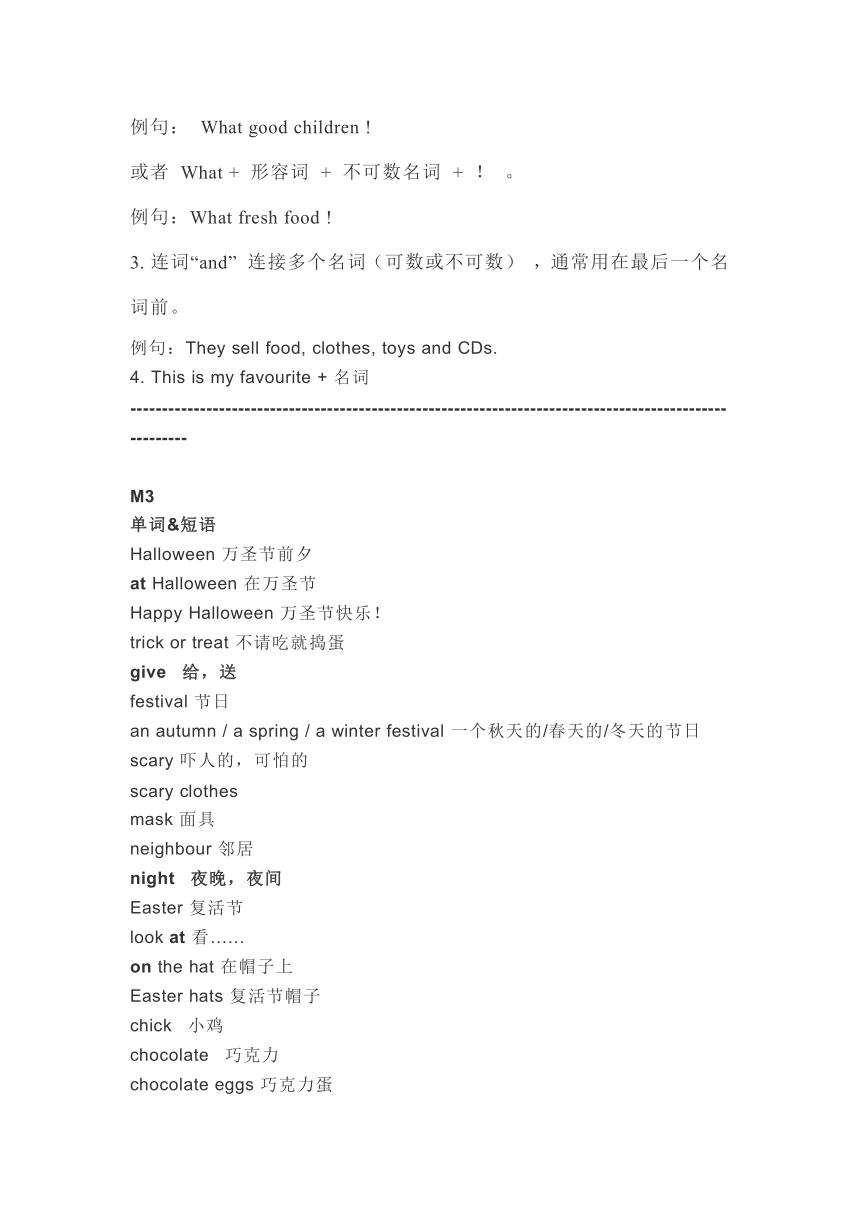
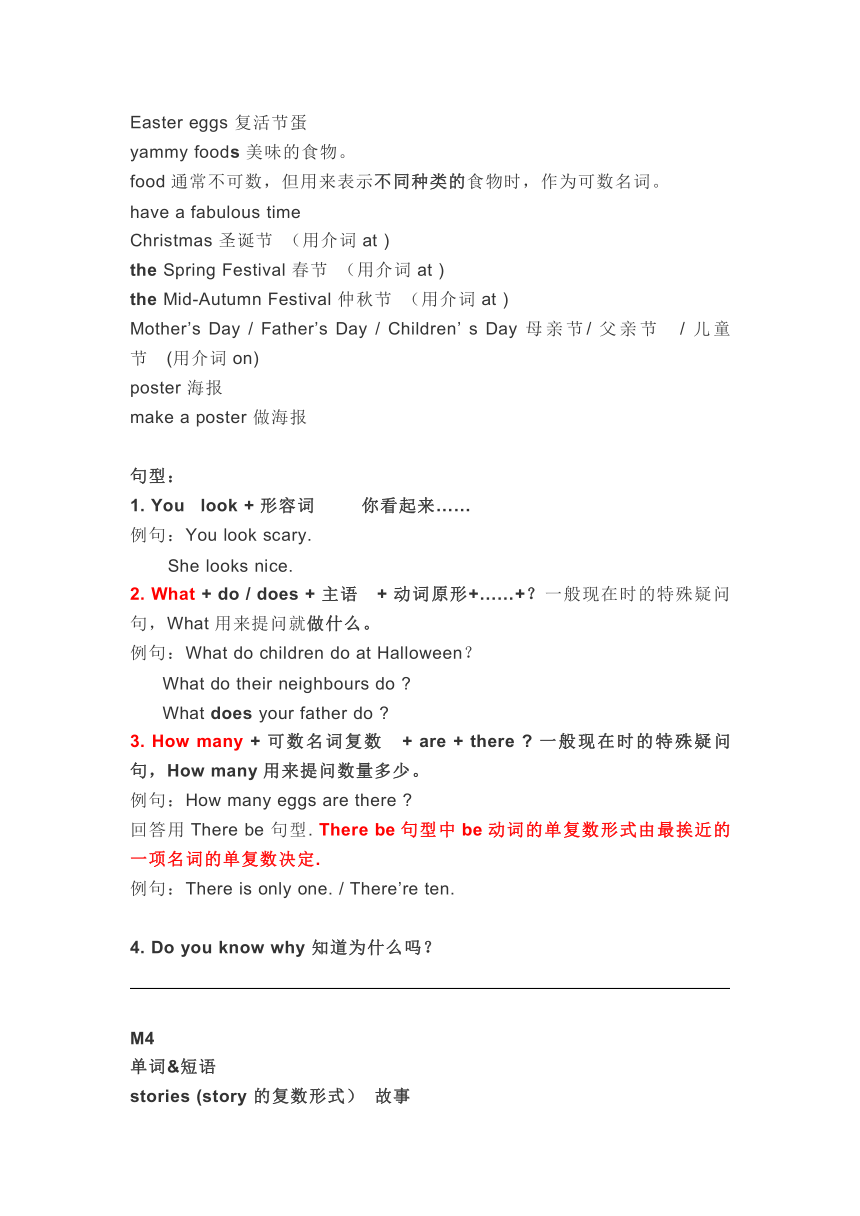
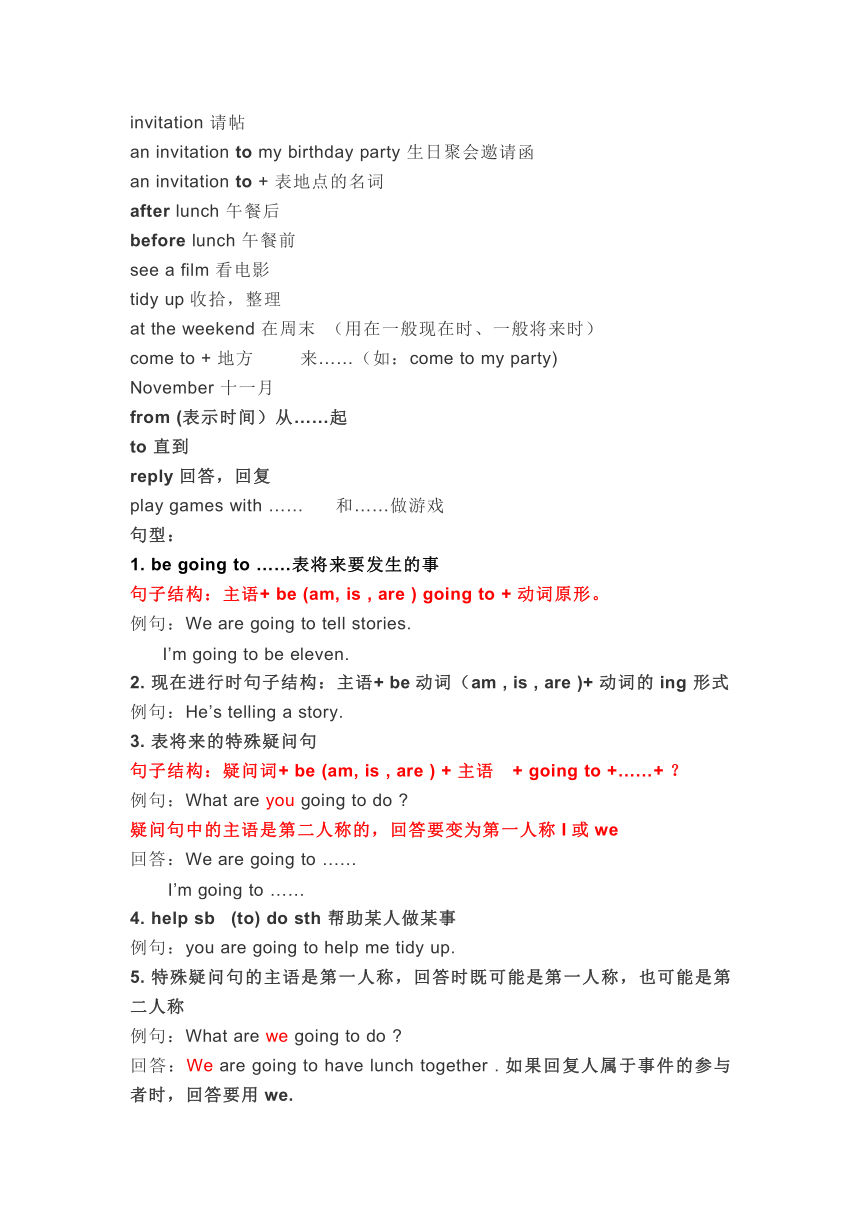
文档简介
外研版一起五年级上册知识点汇总
M1
单词&短语
two years ago两年前
look different?看起来不一样(不同)
for ?达,计?(for two years )
different ?不同的
feed sth?喂……(feed the birds, feed them)
bench?长凳
desk?桌子
the pictures of our school?我们学校的照片
then?那么,就
playground?操场,运动场
in the playground?在操场上
How about …… ??……怎么样
on the floor?在地板上
little trees <------->tall trees
small playground <------> big playground
talk about?谈论,讨论 (talk about changes)
句型
1.?This is ……vs This was……
2.?There be?句型的一般现在时?There is / are
3.?There be?句型的过去时There was/were
4.?There be一般过去时否定句?there was/were not
如:There wasn’t a clock here?before.
????There weren’t?any?benches here?before.
5.?一般现在时的一般疑问句结构:Do/Does +主语+动词原形+……+表时间的词语+?
注意:主语是第三人称单数的,把Does提前。
主语除去第一、二人称及第三人称的复数形式,其余的都属于三单
例句:Does ?London look different now ?
回答:?Yes, it does (主语+ do/does) / No, it doesn’t. (主语+ do/does+not )
例句:Do?you?like the park now ?
回答:Yes,?I?do. (一般疑问句中的主语是第二人称的,回答要变为第一人称I或we)
??????No, I don’t.
?
-------------------------------------------------------------------------------------------------------
?
M2
单词和短语
?
heavy?重的
let?允许,让
come on?快点
sell?卖,销售
sometimes ?有时
over there?在那边
put ……in ……把……放在……里
put the bags in the car
carry?运送,搬运
helpful?有帮助的,乐于助人的
a lot of = lots of?后跟可数名词复数或不可数名词
goody ??复数:goodies?好吃的东西
?
句型:
1.??Let’s=Let us +?动词原形???让我们……吧。
例句:Let’s go to the supermarket.
??????Let’s go .
2. What +a/an +形容词 +可数名词单数+ ! ?
感叹句,表达喜、怒、哀、乐以及惊奇、惊讶等强烈感情的句子。
例句:What a big supermarket !
?What + 形容词 + 可数名词复数 + !
例句: What good children !
或者??What + 形容词 + 不可数名词 + ! 。
例句:What fresh food !
3.?连词“and” 连接多个名词(可数或不可数) ,通常用在最后一个名词前。
例句:They sell food, clothes, toys and CDs.
4. This is my favourite +?名词
-------------------------------------------------------------------------------------------------------
?
M3
单词&短语
Halloween?万圣节前夕
at?Halloween?在万圣节
Happy Halloween?万圣节快乐!
trick or treat?不请吃就捣蛋
give ?给,送
festival?节日
an autumn / a spring / a winter festival?一个秋天的/春天的/冬天的节日
scary?吓人的,可怕的
scary clothes
mask?面具
neighbour?邻居
night ?夜晚,夜间
Easter?复活节
look?at?看……
on?the hat?在帽子上
Easter hats?复活节帽子
chick ?小鸡
chocolate ?巧克力
chocolate eggs?巧克力蛋
Easter eggs?复活节蛋
yammy foods?美味的食物。
food通常不可数,但用来表示不同种类的食物时,作为可数名词。
have a fabulous time
Christmas?圣诞节 (用介词at )
the?Spring Festival?春节 (用介词at )
the?Mid-Autumn Festival?仲秋节 (用介词at )
Mother’s Day / Father’s Day / Children’ s Day?母亲节/?父亲节?/?儿童节?(用介词on)
poster?海报
make a poster?做海报
?
句型:
1.?You ?look +?形容词 ??你看起来……
例句:You look scary.
???????She looks nice.
2.?What?+ do / does +?主语?+?动词原形+……+?一般现在时的特殊疑问句,What用来提问就做什么。
例句:What do children do at Halloween?
??????What do their neighbours do ?
??????What?does?your father do ?
3.?How many?+?可数名词复数?+ are + there ??一般现在时的特殊疑问句,How many用来提问数量多少。
例句:How many eggs are there ?
回答用There be?句型.?There be句型中be动词的单复数形式由最挨近的一项名词的单复数决定.
例句:There is only one. / There’re ten.
?
4.?Do you know why?知道为什么吗?
?
?
M4
单词&短语
stories (story?的复数形式) 故事
invitation?请帖
an invitation?to?my birthday party?生日聚会邀请函
an invitation?to?+?表地点的名词
after?lunch?午餐后
before?lunch?午餐前
see a film?看电影
tidy up收拾,整理
at the weekend?在周末 (用在一般现在时、一般将来时)
come to +?地方 ??来……(如:come to my party)
November?十一月
from (表示时间)从……起
to?直到
reply回答,回复
play games with …… ????和……做游戏
句型:
1.?be going to ……表将来要发生的事
句子结构:主语+ be (am, is , are ) going to +?动词原形。
例句:We are going to tell stories.
??????I’m going to be eleven.
2.?现在进行时句子结构:主语+ be动词(am , is , are )+?动词的ing?形式
例句:He’s telling a story.
3.?表将来的特殊疑问句
句子结构:疑问词+ be (am, is , are ) +?主语?+ going to +……+??
例句:What are?you?going to do ?
疑问句中的主语是第二人称的,回答要变为第一人称I或we
回答:We are going to ……
???????I’m going to ……
4.?help sb ?(to) do sth?帮助某人做某事
例句:you are going to help me tidy up.
5.?特殊疑问句的主语是第一人称,回答时既可能是第一人称,也可能是第二人称
例句:What are?we?going to do ?
回答:We?are going to have lunch together .?如果回复人属于事件的参与者时,回答要用we.
例句:What are?we?going to do in the concert.
回答:You?are going to play the erhu .?如果回复人不属于事件的参与者时,回答时要将主语变为You.
?
-------------------------------------------------------------------------------------------------------
M5
单词&短语
?
mine我的(名词性物主代词)
whose?谁的
yours?你的,你们的
hers?她的
both?两……(都),两个……(都)
run home?往家跑
wet湿的
That’s OK.没关系
take away移走,拿走
worker?工人
still还,仍然
句型
1.?Whose +?名词?+ ?be?动词?+?代词?+ ??
whose谁的, 用来提问所属关系
例句:Whose eraser is it ?
??????Whose flowers are they ?
回答用名词性物主代词。相当于名词,后面不再加名词?。要么出现在句首,要么出现在句尾。
例句:It’s mine(=my eraser ).
??????It’s yours(=your eraser).
?
?
?
2.?want to do sth?想要做某事
??例句:Sam wants to wear my T-shirt.
3.?both表复数含义,be动词要用复数形式。
例句: Both your T-shirts?are?wet.
both your T-shirts = both of your T-shirts
-------------------------------------------------------------------------------------------------------
?
M6
单词&短语
?
well?好,?熟练地
high?高高地
true?真实的
match?比赛
after the match?比赛后
got (get的过去式)得到
eighty?八十
point?分数
get +?基数词?+ point(s)?得到多少分
fan?狂热爱好者,迷
first fan?第一球迷
seventy?七十
sixty ?六十
the other team?另一队
?
句型
?
1.?一般现在时的一般疑问句
句子结构:Do / Does +?主语?+?动词原形?+?其他?+??
例句:Do?you?want to play basketball ?
回答:Yes,?I?do .
??????No,?I?don’t .
注意:疑问句中是第二人称的,回答时要变为第一人称。
?
2.?情态动词can?的用法
情态动词是一种本身有一定的词义,表示说话人的情绪、态度或语气的动词,但不能单独作谓语,只能和其他动词原形构成谓语。
?
3.?含情态动词的陈述句结构:主语?+ can +?动词原形?。
例句:You can jump high.
?
含情态动词的一般疑问句结构:can +?主语?+?其他部分照抄?+??
例句:Can?you?run fast ?
回答:Yes,?I?can. ?/ ?No,?I?can’t .
注意:疑问句中是第二人称的,回答时要变为第一人称。
例句:?Can he play basketball??
回答:Yes, he can. / No, he can’t .
?
含情态动词的特殊疑问句结构:疑问词?+ can +?主语?+?其他部分?+??
例句:What can?you?do ?
回答:I?can……
?
例句:What can they do ?
回答:They can……
?
4.?基数词
???基数词?:?表示数目的词称为基数词。
口诀:
1至12逐个记,
13至19 teen结尾
20至90整十数,
ty结尾是后缀
要是表示几十几,连字符十位连个位
若要表示几百几,hundred之后and立
基数词?:?表示数目的词称为基数词。其形式如下:
(1).从1——10 one,two,three,four,five,six,seven,eight,nine,ten.
(2).从?11——19 eleven,twelve,?thirteen,?fourteen,?fifteen,?sixteen,seventeen,eighteen,?nineteen. 这里除?eleven,?twelve,?thirteen,?fifteen,eighteen为特殊形式外,fourteen,sixteen,seventeen,nineteen都是由其个位数形式后添加后缀-teen构成。
(3).从?20——99?整数几十中除twenty,thirty, forty,fifty,eighty为特殊形式外,sixty,seventy,ninety都是其个位数形式后添加后缀-ty构成。表示几十几时,在几十和个位基数词形式之间添加连字符“-”?。?如:21 twenty-one??,?76 seventy-six
?
M7
单词&短语
useful?有用的
do a lot?做很多
do a lot of?…… 做很多……事
show?(电视或广播)节目
TV show?电视节目
special?特别的
presenter ((电视或广播节目的)主持人
blind?失明的,瞎的
could (can的过去式)能
speak?说(某种语言)
fire?火灾,失火
inside?在……里面
firefighter?消防队员
couldn’t = could not?不能
句型
1.?情态动词can?的用法
情态动词是一种本身有一定的词义,表示说话人的情绪、态度或语气的动词,但不能单独作谓语,只能和其他动词原形构成谓语。
?
2.?含情态动词can的陈述句结构:主语?+ can +?动词原形?。
例句:His dog can help him.
??????I can?be?your good friend.
否定句结构:主语?+ can + not +?动词原形
例句:This dog can’t read
含情态动词的一般疑问句结构:can +?主语?+?其他部分照抄?+??
例句:Can Fifi help blind people ?
回答:Yes, he can. ?/ ?No, he can’t .
3.?情态动词?can?的过去式?could?的用法,表过去的能力。
陈述句结构:主语?+ could +?动词原形 。
例句:The bird could speak English.
否定句结构:主语?+ could + not +?动词原形 。
?例句:The firefighters couldn’t see the people.
?
?
M8
单词&短语
often?经常
around?围绕,环绕
sit around tables?围桌而坐
start?开始
start at +点钟 ?……点开始
finish at +?点钟 ……点结束
Sam and Amy’s school ?萨姆和艾米的学校(指两个人在同一学校)
take photos?照相?(= take pictures)
line行,排,列
sit in lines ?排排坐
do morning exercises?做早操?(注:包含一系形/成套动作的锻炼用exercise的复数)
half?一半
past?晚于,过(几点)
miss?想念
start school?上学
study?学习
open?开着的
wall?墙
on?the wall?在墙上
have fun?玩得开心
break?课间休息
break time?课间休息时间
at?break time?在课间休息时间
talk about yourself?谈谈你自己
get ready for sth?为……做好准备
introduce sth to sb ?把……介绍给谁
句型
1.?welcome to +?地点等名词
to在此是介词,后跟名词或动名词
例句:Welcome to my party.
2.?In the UK,?school?often?starts?at 9 o’clock?and?finishes?at half past three.
and?前后时态一致,实义动词的时态形式要一致。
school?在此句中的意思指“上课时间”,不可数名词。
school指学校时,是可数名词。
3.?一般将来时
概念: ?表示将来某一时刻的动作或状态,或将来某一段时间内经常的动作或状态。
标志语:tomorrow,the day after tomorrow,next week (month, year…),in the year 2022 (将来的某个年份), soon,
from now on, in the future
陈述句肯定式结构:主语?+ will +?动词原形
例句:I’?ll study hard.
陈述句否定式结构:主语?+ will + not +?动词原形
例句:I won’t (=will not ) go to the park.
4.?It’s the right time to do sth?句型
例句:It’s the right time to start.
5. There be句型中be动词单复数的就近原则
There be句型中be动词的单复数形式由最接近的一项的单复数决定。
例句:There?are?two pencils?on the table.
??????There?is?a cap?on the table.
?
?
M8
单词&短语
nothing?没有事情,没有东西
表心情的单词:sad?(悲伤的,难过的),?happy(高兴的),angry (生气的),bored (无聊的)
think?思考,想,觉得
think about ?考虑……捉摸……
make sb sth?为某人制做什么(如:make you a surprise present?为你制作惊喜礼物)
drank (drink的过去式)喝,饮
?
句型
1.?含有be动词的一般现在时的一般疑问句。
询问对方心情的例句:
Are you sad ( happy, angry , bored,hungry, thirsty,tired )?
结构:Be动词?+?主语?+?表心情的形容词?+?? ?
肯定回答:Yes,?主语?+ be动词.
否定回答:No,?主语?+ be动词?+ not.
例句:Are you sad ?
??????Yes, I’m ?????
??????No, I’m not
注意:疑问句中主语是第二人称的,回答时要变为第一人称。
例句:Is Amy sad ?
??????Yes, she is.
??????No, she isn’t .
注意:如果据疑问句中的名字能判断出性别,回答时要变为相应的人称代词
2.?want to do sth?想要做什么
一般现在时陈述句结构:主语?+ want (s) + to +?动词原形
注意:主语是三单时,want?要变为wants
例句:I want to play with my doll.
一般疑问句结构:Do / Does ?+ ?主语?+?动词原形?+?其余照抄?+??
例句:Do you want to play with my doll??
3.?What are you thinking about ??你在思考什么?
现在进行时的特殊疑问句。
结构:疑问词+ be?(am, is, are ) ?+?主语?+?其他部分?+??
4.?be going to?句型
表示将来某一时刻的动作或状态。
结构:主语?+ be(am,is ,are) + going to +?动词原形
例句:I’m going to make you a surprise present
5.?What’s the matter ??怎么了?/?出什么事了?
???Nothing.?没什么。
6.?一般过去时
陈述句结构:
①主语?+ be动词的过去式(was/were) ?+?表过去时间的单词。
如:He was sad yesterday .
②主语?+ ?实意动词过去式 ?+?表过去时间的单词。
如:He helped his mum make a cake yesterday.
????The rain stopped.
7.?过去进行时
陈述句结构:
主语?+ be动词的过去式(was / were ) +?动词现在分词( 即动词的ing形式)+表过去时间的单词。
例句:It was raining yesterday。
?
8.?help sb do sth?或?help sb to do sth帮助某人干某事
例句:She helped her mum make a cake = She helped her mum?to?make a cake.
?
?
M10
?
单词&?短语
?
should?应该
go to bed?上床睡觉
make a mess?弄得一团糟
tidy
tidy up?收拾,整理(如tidy up your room=clean your room)
shouldn’t = should not?不应该
take down?取下,拿下
take books down?把书取下来
clean?干净的
bring sth to sb/somewhere?把某物带到某人或某地。
work hard?努力学习
rule?规则,规章
kind?友好的,善意的,体贴的
jump on the bed?在床上跳
?
句型
?
1.?情态动词should的用法
should作为情态动词最基本的意思是“应该”——既可指有责任或义务?“应该”做某事,也可指建议或劝告某人“应该”做某事,还可指推测某事或某情况“应该”会发生,等等。如:
You should go to bed at nine.
You should tidy your toys.
You should be kind .
You should be helpful.
陈述句肯定句结构:主语?+ should +?动词原形+其他
否定句结构:主语?+ should +not +?动词原形+其他
例句:You shouldn’t play with the CDs.
??????You shouldn’t be late.
2.?What a?……句型?(M2曾讲过)
?What +a/an +形容词?+可数名词单数+?!??
感叹句,表达喜、怒、哀、乐以及惊奇、惊讶等强烈感情的句子。
例句:What a big supermarket !
??????What a good boy !
?What + 形容词 + 可数名词复数 + !
例句: What good children !
或者??What + 形容词 + 不可数名词 + ! 。
例句:What fresh food !
小学3起五年级英语上册知识点梳理
Module 1
短语:
1、come back ?回来???????????
come back from+某地 ?从某地回来
2、look at sb/stn ?看某人/某物?????
3、wait for sb ??等候某人
4、hurry up ??赶快?????
5.by bus ?乘公交车
6、phone sb=call sb ??给某人打电话
7、动词过去式:
go---went ??????meet------met
see---- saw ??come----came ???????
buy---bought
run----ran ???drop----dropped
句子:
1、--Did you come back yesterday? ??
2、--No,we came back last Sunday.
3、Let’s buy some.????(Let’s+动词原形 ???我们做······去吧。)
3、Wait for me.
4、I dropped my ice cream.
5、We bought ice cream.
6、We went home by bus.
语法:一般过去时?
一般过去时(动词+ed)
动词过去式(动词+ed)规则:
1)、直接加-ed?????????比如:looked, ??played, ??
2)、去e 加-ed ????????比如:taked, ???rided(骑)
3)、变y为i 加-ed ?比如:carry-carried, ?????
4)、双写加-ed ??????比如:
5)、不规则变化 ???比如:run-ran , ?swim-swam
肯定句:Sb +动词过去式.
否定句:Sb +didn’t(did ?not)+动词原形.
一般疑问句:Did+sb +动词原形???????
?Yes,sb did./No,sb didn’t.
?
Module 2
短语:
1、buy some fruit ??买一些水果
2、make a shopping list ?制定一个购物清单
3、also也,放句中?????????????too也,放句末 ?
4、some“一些”,接可数名词复数或不可数名词,用在肯定句中
???any“一些”,接可数名词复数或不可数名词,用在否定句中?
I have?????????????apples.
I don’t have????????????apples.
Do you have????????????apples?
5、half a kilo ??半公斤
6、a lot of=lots of ?许多 ?接可数名词复数或不可数名词
7、over there ?那边
8、动词过去式:buy---bought ?
eat---ate ????drink---drank
句子:
1、--What did you buy?
??---I bought some apples.??
2、--How many bananas did you buy?
???--We didn’t buy any bananas.
注:How many +可数名词复数+一般疑问句?
3、--How much cheese did you buy?
???--Half a kilo.
注:How much +不可数名词+一般疑问句?
回答用half a kilo / 数词+kilo(s) / 数词+bottle(s)
语法:特殊疑问句?
特殊疑问句
构成:特殊疑问词+一般疑问句?回答时,根据具体情况回答。
特殊疑问词:
what ?什么??????who ?谁??????whose ?谁的???????why ?为什么?????how ?怎样?????????where ?哪里????????when ?什么时候
Module 3
短语:
1、at the weekend ??在周末
2、2、visit lots of places ?参观许多地方
3、take a boat trip ?坐船旅行????
4、have a good day ??度过愉快的一天
5、one hour and twenty minutes一小时二十分钟
6、the Great Wall ?长城
7、at ten o’clock ??在十点钟???
???at+ 时间点 ??在....点钟????
8、take a photo of sb/sth ??给某人/某物拍照
9、动词过去式:
tell---told ?????go----went
??take----took ????have----had
句子:
1、--Where did you go?
???--We went to the British Museum.
2、--How did you go to these places?
???--We went by bus.
3、What did you do at the weekend?
4、They arrived there at ten o’clock.
5、Da Ming took a photo of his father.
Module 4
短语:
1、buy sth for sb=buy sb sth ?给某人买某物
2、a pair of+复数 ?一双
??a pair of shoes/socks ??一双鞋/一双袜子???
?a pair of shorts ??一条短裤
3、want to do ?想要做某事
4、动词过去式:
buy---bought ????take---took
lose---lost ??????find---found ????
?fly---flew
eat---ate ???????ride--rode- ?????
?meet---met
句子:
1、--What’s the matter?
???--I lost my cap.
???What’s the matter(with sb)?
2、Let’s go and fly it.
???Let’s+动词原形。
3、Did you wash Lingling’s T-shirt?
4、Mum bought a new T-shirt for me.
5、I’m sorry.
语法:物主代词
物主代词:表示“某人的”,后面跟名词。
my我的
our我们的
your你的?
your你们的
his他的
her她的
its它的
their他们的
Module 5
短语:
1、give out ?分发??????????
2、all right ??好的????
3、child---(复数)children
4、in your class ?在你班上
5、so many+可数名词复数 ?如此多....
6、but ?但是
7、thirteen ?fourteen ?fifteen ?sixteen ?seventeen
eighteen ?nineteen
8、twenty ?thirty ?forty ?fifty ?sixty ?seventy
eighty ?ninety
句子:?
1、How many faces can you see?
2、There are only nineteen crayons.
3、--How many pupils are there in your class?
???--There are fourteen.
语法:There be句型
There be句型:
表示“某地有某...”。
常用结构:There is/are+某人/某物+地点。
There is+a/an+可数名词单数+地点。
There is+a/an+不可数名词+地点。
There are+可数名词复数(s)+地点。
Module 6
短语:
1、run fast ?跑得快?
???run really/very fast ?跑得真快,跑得很快
2、pass the ball well ?传球传得好??
3、catch the ball well ??接球接得好
4、play football well ???踢球踢得好
5、jump high ?跳高
???jump really/very high ?跳得真高,跳得很高
7、be good at ??擅长??????????????
7、in the past ?过去
8、动词过去式:run--ran ??swim--swam
句子:
1、--Can you pass the ball well?
???--Not very well.
2、You are very good at basketball.
3、You can play football well.
4、In the past,he ran very fast.
??very非常,很
5、The black horse ran really fast.
??really ??真的,确实
语法:can??
can “能,能够,可以,会”,后面跟动词原形
肯定句:Sb+can+动词原形。
否定句:Sb+can’t+动词原形。(can后加not,其余不变)
一般疑问句:Can+sb+动词原形?(can提前,其余不变)
Yes,sb can. ?/ ??No,sb can’t.
?
Module 7
短语:
1、help a lot ?帮助很大??????????????????
2、help sb ?帮某人
3、a TV show about dogs ?一个关于狗的电视节目
4、sit down ?坐下
句子:
1、This man is blind.He can’t see.
2、--Can we have a dog?
???--No,we can’t.
3、This little girl can’t walk.
4、Her father helps her.
5、Sb+be(am/is/are/was/were)+表特点的词语。
代词宾格:表示某人,作宾语用。
me我
us我们
you你?
you你们
him他
her她
it它
them他们
Module 8
短语:
1、what time ?几点钟???????????????
2、go to bed ??上床睡觉
3.be late for school ?上学迟到?
4、in the morning ??在早上
5、at half past seven ?在七点半
???at+时间点 ??在......点?
???half past+数字 ?......点半
6、do exercise ?做操
???do morning exercises ??做早操
7、in the playground ??在操场上????
8、want to do ?想要做某事
9、play with sb ??和某人玩
句子:
1、--What time is it now?
???--It’s half past eight.
??--What time is it now?
???--It’s +时间点。
2、I don’t want to be late for school tomorrow.
3、--What time do you get up?
???--I get up at half past seven.
4、--What time does your school start?
???--My school starts at nine o’clock in the morning.
5、She always wants to walk.
语法:一般现在时
一般现在时:表示经常发生的动作或目前的状况。
第三人称单数做主语,动词词尾加“s”
动词词尾加“s”规则:
1)直接加?
2)以o、s、x、sh、ch结尾,加es
3)“辅音字母+y结尾”,变y为i加es
肯定句:Sb(三单)+动词s+其它。
否定句:Sb(三单)+doesn’t+动词原形+其它。(句中加doesn’t,动词还原,其余不变)
一般疑问句:Does+某人+动词原形+其它?(句首加does,动词还原,其余不变)
??Yes,sb does./ No,sb doesn’t.
其它人称做主语,动词用原形
肯定句:Sb+动词+其它。
否定句:Sb+don’t+动词原形+其它。(句中加don’t,其余不变)
一般疑问句:Do+某人+动词原形+其它?(句首加do,其余不变)
??Yes,sb do./ No,sb don’t.
Module 9
短语:
1、feel bored(无聊)/angry(生气)/sad(难过)/happy(高兴)/tired(疲倦)/hungry(饥饿)
2、feel cool(凉快)/warm(暖和)/cold(寒冷)/hot(热)
3、of course ??当然
???of course not ?当然不??
4、be ill in hospital ?生病住院
5、call sb =phone sb?给某人打电话??
6、win a chess game ?赢了围棋比赛
7、on the farm ?在农场????????????
8、all day ?整天
9、动词过去式:win---won ?lose---lost
句子:
1、What’s the matter???
???What’s the matter with sb?
2、--Are you feeling bored?
???--No./Yes.
3、--Is she feeling sad?
???--Yes,she is.
4、He is happy.
5、I won a chess game last week.
6、--How does he feel?
???--He feels hungry,
7、表达感受:
??Sb+be(am/is/are)+feeling+表感受的词。
??Sb+be(am/is/are)+表感受的词。
??Sb+feel/feels+表感受的词。
?
Module 10
短语:
1、in the kitchen ?在厨房里????
2、in the bedroom ?在卧室里
3、in the toilet ?在厕所里??
4、in the living room ?在客厅里
5、play hide-and-seek ?玩捉迷藏游戏
6、on the grass ?在草地上
7、in the zoo ?在动物园里???????????
8、climb the tree ?爬树
句子:
1、--Where is Sam?
--He is in the bedroom.
??Sb+be(am/is/are/was/were)+地点。 ?某人在某地
2、--Where did you find John?
???--I found John in the kitchen.
???I found+某人/某物+地点。 ?我在某地发现某人/某物。
3、Let’s go. ?
???Let’s+动词原形. ??我们... ...吧。
4、Don’t walk on the grass.
5、Don;t climb the tree.
???Don’t+动词原形. ??不要... ...
6、You can watch TV.
???You can+动词原形。 ?“你可以做.....”
M1
单词&短语
two years ago两年前
look different?看起来不一样(不同)
for ?达,计?(for two years )
different ?不同的
feed sth?喂……(feed the birds, feed them)
bench?长凳
desk?桌子
the pictures of our school?我们学校的照片
then?那么,就
playground?操场,运动场
in the playground?在操场上
How about …… ??……怎么样
on the floor?在地板上
little trees <------->tall trees
small playground <------> big playground
talk about?谈论,讨论 (talk about changes)
句型
1.?This is ……vs This was……
2.?There be?句型的一般现在时?There is / are
3.?There be?句型的过去时There was/were
4.?There be一般过去时否定句?there was/were not
如:There wasn’t a clock here?before.
????There weren’t?any?benches here?before.
5.?一般现在时的一般疑问句结构:Do/Does +主语+动词原形+……+表时间的词语+?
注意:主语是第三人称单数的,把Does提前。
主语除去第一、二人称及第三人称的复数形式,其余的都属于三单
例句:Does ?London look different now ?
回答:?Yes, it does (主语+ do/does) / No, it doesn’t. (主语+ do/does+not )
例句:Do?you?like the park now ?
回答:Yes,?I?do. (一般疑问句中的主语是第二人称的,回答要变为第一人称I或we)
??????No, I don’t.
?
-------------------------------------------------------------------------------------------------------
?
M2
单词和短语
?
heavy?重的
let?允许,让
come on?快点
sell?卖,销售
sometimes ?有时
over there?在那边
put ……in ……把……放在……里
put the bags in the car
carry?运送,搬运
helpful?有帮助的,乐于助人的
a lot of = lots of?后跟可数名词复数或不可数名词
goody ??复数:goodies?好吃的东西
?
句型:
1.??Let’s=Let us +?动词原形???让我们……吧。
例句:Let’s go to the supermarket.
??????Let’s go .
2. What +a/an +形容词 +可数名词单数+ ! ?
感叹句,表达喜、怒、哀、乐以及惊奇、惊讶等强烈感情的句子。
例句:What a big supermarket !
?What + 形容词 + 可数名词复数 + !
例句: What good children !
或者??What + 形容词 + 不可数名词 + ! 。
例句:What fresh food !
3.?连词“and” 连接多个名词(可数或不可数) ,通常用在最后一个名词前。
例句:They sell food, clothes, toys and CDs.
4. This is my favourite +?名词
-------------------------------------------------------------------------------------------------------
?
M3
单词&短语
Halloween?万圣节前夕
at?Halloween?在万圣节
Happy Halloween?万圣节快乐!
trick or treat?不请吃就捣蛋
give ?给,送
festival?节日
an autumn / a spring / a winter festival?一个秋天的/春天的/冬天的节日
scary?吓人的,可怕的
scary clothes
mask?面具
neighbour?邻居
night ?夜晚,夜间
Easter?复活节
look?at?看……
on?the hat?在帽子上
Easter hats?复活节帽子
chick ?小鸡
chocolate ?巧克力
chocolate eggs?巧克力蛋
Easter eggs?复活节蛋
yammy foods?美味的食物。
food通常不可数,但用来表示不同种类的食物时,作为可数名词。
have a fabulous time
Christmas?圣诞节 (用介词at )
the?Spring Festival?春节 (用介词at )
the?Mid-Autumn Festival?仲秋节 (用介词at )
Mother’s Day / Father’s Day / Children’ s Day?母亲节/?父亲节?/?儿童节?(用介词on)
poster?海报
make a poster?做海报
?
句型:
1.?You ?look +?形容词 ??你看起来……
例句:You look scary.
???????She looks nice.
2.?What?+ do / does +?主语?+?动词原形+……+?一般现在时的特殊疑问句,What用来提问就做什么。
例句:What do children do at Halloween?
??????What do their neighbours do ?
??????What?does?your father do ?
3.?How many?+?可数名词复数?+ are + there ??一般现在时的特殊疑问句,How many用来提问数量多少。
例句:How many eggs are there ?
回答用There be?句型.?There be句型中be动词的单复数形式由最挨近的一项名词的单复数决定.
例句:There is only one. / There’re ten.
?
4.?Do you know why?知道为什么吗?
?
?
M4
单词&短语
stories (story?的复数形式) 故事
invitation?请帖
an invitation?to?my birthday party?生日聚会邀请函
an invitation?to?+?表地点的名词
after?lunch?午餐后
before?lunch?午餐前
see a film?看电影
tidy up收拾,整理
at the weekend?在周末 (用在一般现在时、一般将来时)
come to +?地方 ??来……(如:come to my party)
November?十一月
from (表示时间)从……起
to?直到
reply回答,回复
play games with …… ????和……做游戏
句型:
1.?be going to ……表将来要发生的事
句子结构:主语+ be (am, is , are ) going to +?动词原形。
例句:We are going to tell stories.
??????I’m going to be eleven.
2.?现在进行时句子结构:主语+ be动词(am , is , are )+?动词的ing?形式
例句:He’s telling a story.
3.?表将来的特殊疑问句
句子结构:疑问词+ be (am, is , are ) +?主语?+ going to +……+??
例句:What are?you?going to do ?
疑问句中的主语是第二人称的,回答要变为第一人称I或we
回答:We are going to ……
???????I’m going to ……
4.?help sb ?(to) do sth?帮助某人做某事
例句:you are going to help me tidy up.
5.?特殊疑问句的主语是第一人称,回答时既可能是第一人称,也可能是第二人称
例句:What are?we?going to do ?
回答:We?are going to have lunch together .?如果回复人属于事件的参与者时,回答要用we.
例句:What are?we?going to do in the concert.
回答:You?are going to play the erhu .?如果回复人不属于事件的参与者时,回答时要将主语变为You.
?
-------------------------------------------------------------------------------------------------------
M5
单词&短语
?
mine我的(名词性物主代词)
whose?谁的
yours?你的,你们的
hers?她的
both?两……(都),两个……(都)
run home?往家跑
wet湿的
That’s OK.没关系
take away移走,拿走
worker?工人
still还,仍然
句型
1.?Whose +?名词?+ ?be?动词?+?代词?+ ??
whose谁的, 用来提问所属关系
例句:Whose eraser is it ?
??????Whose flowers are they ?
回答用名词性物主代词。相当于名词,后面不再加名词?。要么出现在句首,要么出现在句尾。
例句:It’s mine(=my eraser ).
??????It’s yours(=your eraser).
?
?
?
2.?want to do sth?想要做某事
??例句:Sam wants to wear my T-shirt.
3.?both表复数含义,be动词要用复数形式。
例句: Both your T-shirts?are?wet.
both your T-shirts = both of your T-shirts
-------------------------------------------------------------------------------------------------------
?
M6
单词&短语
?
well?好,?熟练地
high?高高地
true?真实的
match?比赛
after the match?比赛后
got (get的过去式)得到
eighty?八十
point?分数
get +?基数词?+ point(s)?得到多少分
fan?狂热爱好者,迷
first fan?第一球迷
seventy?七十
sixty ?六十
the other team?另一队
?
句型
?
1.?一般现在时的一般疑问句
句子结构:Do / Does +?主语?+?动词原形?+?其他?+??
例句:Do?you?want to play basketball ?
回答:Yes,?I?do .
??????No,?I?don’t .
注意:疑问句中是第二人称的,回答时要变为第一人称。
?
2.?情态动词can?的用法
情态动词是一种本身有一定的词义,表示说话人的情绪、态度或语气的动词,但不能单独作谓语,只能和其他动词原形构成谓语。
?
3.?含情态动词的陈述句结构:主语?+ can +?动词原形?。
例句:You can jump high.
?
含情态动词的一般疑问句结构:can +?主语?+?其他部分照抄?+??
例句:Can?you?run fast ?
回答:Yes,?I?can. ?/ ?No,?I?can’t .
注意:疑问句中是第二人称的,回答时要变为第一人称。
例句:?Can he play basketball??
回答:Yes, he can. / No, he can’t .
?
含情态动词的特殊疑问句结构:疑问词?+ can +?主语?+?其他部分?+??
例句:What can?you?do ?
回答:I?can……
?
例句:What can they do ?
回答:They can……
?
4.?基数词
???基数词?:?表示数目的词称为基数词。
口诀:
1至12逐个记,
13至19 teen结尾
20至90整十数,
ty结尾是后缀
要是表示几十几,连字符十位连个位
若要表示几百几,hundred之后and立
基数词?:?表示数目的词称为基数词。其形式如下:
(1).从1——10 one,two,three,four,five,six,seven,eight,nine,ten.
(2).从?11——19 eleven,twelve,?thirteen,?fourteen,?fifteen,?sixteen,seventeen,eighteen,?nineteen. 这里除?eleven,?twelve,?thirteen,?fifteen,eighteen为特殊形式外,fourteen,sixteen,seventeen,nineteen都是由其个位数形式后添加后缀-teen构成。
(3).从?20——99?整数几十中除twenty,thirty, forty,fifty,eighty为特殊形式外,sixty,seventy,ninety都是其个位数形式后添加后缀-ty构成。表示几十几时,在几十和个位基数词形式之间添加连字符“-”?。?如:21 twenty-one??,?76 seventy-six
?
M7
单词&短语
useful?有用的
do a lot?做很多
do a lot of?…… 做很多……事
show?(电视或广播)节目
TV show?电视节目
special?特别的
presenter ((电视或广播节目的)主持人
blind?失明的,瞎的
could (can的过去式)能
speak?说(某种语言)
fire?火灾,失火
inside?在……里面
firefighter?消防队员
couldn’t = could not?不能
句型
1.?情态动词can?的用法
情态动词是一种本身有一定的词义,表示说话人的情绪、态度或语气的动词,但不能单独作谓语,只能和其他动词原形构成谓语。
?
2.?含情态动词can的陈述句结构:主语?+ can +?动词原形?。
例句:His dog can help him.
??????I can?be?your good friend.
否定句结构:主语?+ can + not +?动词原形
例句:This dog can’t read
含情态动词的一般疑问句结构:can +?主语?+?其他部分照抄?+??
例句:Can Fifi help blind people ?
回答:Yes, he can. ?/ ?No, he can’t .
3.?情态动词?can?的过去式?could?的用法,表过去的能力。
陈述句结构:主语?+ could +?动词原形 。
例句:The bird could speak English.
否定句结构:主语?+ could + not +?动词原形 。
?例句:The firefighters couldn’t see the people.
?
?
M8
单词&短语
often?经常
around?围绕,环绕
sit around tables?围桌而坐
start?开始
start at +点钟 ?……点开始
finish at +?点钟 ……点结束
Sam and Amy’s school ?萨姆和艾米的学校(指两个人在同一学校)
take photos?照相?(= take pictures)
line行,排,列
sit in lines ?排排坐
do morning exercises?做早操?(注:包含一系形/成套动作的锻炼用exercise的复数)
half?一半
past?晚于,过(几点)
miss?想念
start school?上学
study?学习
open?开着的
wall?墙
on?the wall?在墙上
have fun?玩得开心
break?课间休息
break time?课间休息时间
at?break time?在课间休息时间
talk about yourself?谈谈你自己
get ready for sth?为……做好准备
introduce sth to sb ?把……介绍给谁
句型
1.?welcome to +?地点等名词
to在此是介词,后跟名词或动名词
例句:Welcome to my party.
2.?In the UK,?school?often?starts?at 9 o’clock?and?finishes?at half past three.
and?前后时态一致,实义动词的时态形式要一致。
school?在此句中的意思指“上课时间”,不可数名词。
school指学校时,是可数名词。
3.?一般将来时
概念: ?表示将来某一时刻的动作或状态,或将来某一段时间内经常的动作或状态。
标志语:tomorrow,the day after tomorrow,next week (month, year…),in the year 2022 (将来的某个年份), soon,
from now on, in the future
陈述句肯定式结构:主语?+ will +?动词原形
例句:I’?ll study hard.
陈述句否定式结构:主语?+ will + not +?动词原形
例句:I won’t (=will not ) go to the park.
4.?It’s the right time to do sth?句型
例句:It’s the right time to start.
5. There be句型中be动词单复数的就近原则
There be句型中be动词的单复数形式由最接近的一项的单复数决定。
例句:There?are?two pencils?on the table.
??????There?is?a cap?on the table.
?
?
M8
单词&短语
nothing?没有事情,没有东西
表心情的单词:sad?(悲伤的,难过的),?happy(高兴的),angry (生气的),bored (无聊的)
think?思考,想,觉得
think about ?考虑……捉摸……
make sb sth?为某人制做什么(如:make you a surprise present?为你制作惊喜礼物)
drank (drink的过去式)喝,饮
?
句型
1.?含有be动词的一般现在时的一般疑问句。
询问对方心情的例句:
Are you sad ( happy, angry , bored,hungry, thirsty,tired )?
结构:Be动词?+?主语?+?表心情的形容词?+?? ?
肯定回答:Yes,?主语?+ be动词.
否定回答:No,?主语?+ be动词?+ not.
例句:Are you sad ?
??????Yes, I’m ?????
??????No, I’m not
注意:疑问句中主语是第二人称的,回答时要变为第一人称。
例句:Is Amy sad ?
??????Yes, she is.
??????No, she isn’t .
注意:如果据疑问句中的名字能判断出性别,回答时要变为相应的人称代词
2.?want to do sth?想要做什么
一般现在时陈述句结构:主语?+ want (s) + to +?动词原形
注意:主语是三单时,want?要变为wants
例句:I want to play with my doll.
一般疑问句结构:Do / Does ?+ ?主语?+?动词原形?+?其余照抄?+??
例句:Do you want to play with my doll??
3.?What are you thinking about ??你在思考什么?
现在进行时的特殊疑问句。
结构:疑问词+ be?(am, is, are ) ?+?主语?+?其他部分?+??
4.?be going to?句型
表示将来某一时刻的动作或状态。
结构:主语?+ be(am,is ,are) + going to +?动词原形
例句:I’m going to make you a surprise present
5.?What’s the matter ??怎么了?/?出什么事了?
???Nothing.?没什么。
6.?一般过去时
陈述句结构:
①主语?+ be动词的过去式(was/were) ?+?表过去时间的单词。
如:He was sad yesterday .
②主语?+ ?实意动词过去式 ?+?表过去时间的单词。
如:He helped his mum make a cake yesterday.
????The rain stopped.
7.?过去进行时
陈述句结构:
主语?+ be动词的过去式(was / were ) +?动词现在分词( 即动词的ing形式)+表过去时间的单词。
例句:It was raining yesterday。
?
8.?help sb do sth?或?help sb to do sth帮助某人干某事
例句:She helped her mum make a cake = She helped her mum?to?make a cake.
?
?
M10
?
单词&?短语
?
should?应该
go to bed?上床睡觉
make a mess?弄得一团糟
tidy
tidy up?收拾,整理(如tidy up your room=clean your room)
shouldn’t = should not?不应该
take down?取下,拿下
take books down?把书取下来
clean?干净的
bring sth to sb/somewhere?把某物带到某人或某地。
work hard?努力学习
rule?规则,规章
kind?友好的,善意的,体贴的
jump on the bed?在床上跳
?
句型
?
1.?情态动词should的用法
should作为情态动词最基本的意思是“应该”——既可指有责任或义务?“应该”做某事,也可指建议或劝告某人“应该”做某事,还可指推测某事或某情况“应该”会发生,等等。如:
You should go to bed at nine.
You should tidy your toys.
You should be kind .
You should be helpful.
陈述句肯定句结构:主语?+ should +?动词原形+其他
否定句结构:主语?+ should +not +?动词原形+其他
例句:You shouldn’t play with the CDs.
??????You shouldn’t be late.
2.?What a?……句型?(M2曾讲过)
?What +a/an +形容词?+可数名词单数+?!??
感叹句,表达喜、怒、哀、乐以及惊奇、惊讶等强烈感情的句子。
例句:What a big supermarket !
??????What a good boy !
?What + 形容词 + 可数名词复数 + !
例句: What good children !
或者??What + 形容词 + 不可数名词 + ! 。
例句:What fresh food !
小学3起五年级英语上册知识点梳理
Module 1
短语:
1、come back ?回来???????????
come back from+某地 ?从某地回来
2、look at sb/stn ?看某人/某物?????
3、wait for sb ??等候某人
4、hurry up ??赶快?????
5.by bus ?乘公交车
6、phone sb=call sb ??给某人打电话
7、动词过去式:
go---went ??????meet------met
see---- saw ??come----came ???????
buy---bought
run----ran ???drop----dropped
句子:
1、--Did you come back yesterday? ??
2、--No,we came back last Sunday.
3、Let’s buy some.????(Let’s+动词原形 ???我们做······去吧。)
3、Wait for me.
4、I dropped my ice cream.
5、We bought ice cream.
6、We went home by bus.
语法:一般过去时?
一般过去时(动词+ed)
动词过去式(动词+ed)规则:
1)、直接加-ed?????????比如:looked, ??played, ??
2)、去e 加-ed ????????比如:taked, ???rided(骑)
3)、变y为i 加-ed ?比如:carry-carried, ?????
4)、双写加-ed ??????比如:
5)、不规则变化 ???比如:run-ran , ?swim-swam
肯定句:Sb +动词过去式.
否定句:Sb +didn’t(did ?not)+动词原形.
一般疑问句:Did+sb +动词原形???????
?Yes,sb did./No,sb didn’t.
?
Module 2
短语:
1、buy some fruit ??买一些水果
2、make a shopping list ?制定一个购物清单
3、also也,放句中?????????????too也,放句末 ?
4、some“一些”,接可数名词复数或不可数名词,用在肯定句中
???any“一些”,接可数名词复数或不可数名词,用在否定句中?
I have?????????????apples.
I don’t have????????????apples.
Do you have????????????apples?
5、half a kilo ??半公斤
6、a lot of=lots of ?许多 ?接可数名词复数或不可数名词
7、over there ?那边
8、动词过去式:buy---bought ?
eat---ate ????drink---drank
句子:
1、--What did you buy?
??---I bought some apples.??
2、--How many bananas did you buy?
???--We didn’t buy any bananas.
注:How many +可数名词复数+一般疑问句?
3、--How much cheese did you buy?
???--Half a kilo.
注:How much +不可数名词+一般疑问句?
回答用half a kilo / 数词+kilo(s) / 数词+bottle(s)
语法:特殊疑问句?
特殊疑问句
构成:特殊疑问词+一般疑问句?回答时,根据具体情况回答。
特殊疑问词:
what ?什么??????who ?谁??????whose ?谁的???????why ?为什么?????how ?怎样?????????where ?哪里????????when ?什么时候
Module 3
短语:
1、at the weekend ??在周末
2、2、visit lots of places ?参观许多地方
3、take a boat trip ?坐船旅行????
4、have a good day ??度过愉快的一天
5、one hour and twenty minutes一小时二十分钟
6、the Great Wall ?长城
7、at ten o’clock ??在十点钟???
???at+ 时间点 ??在....点钟????
8、take a photo of sb/sth ??给某人/某物拍照
9、动词过去式:
tell---told ?????go----went
??take----took ????have----had
句子:
1、--Where did you go?
???--We went to the British Museum.
2、--How did you go to these places?
???--We went by bus.
3、What did you do at the weekend?
4、They arrived there at ten o’clock.
5、Da Ming took a photo of his father.
Module 4
短语:
1、buy sth for sb=buy sb sth ?给某人买某物
2、a pair of+复数 ?一双
??a pair of shoes/socks ??一双鞋/一双袜子???
?a pair of shorts ??一条短裤
3、want to do ?想要做某事
4、动词过去式:
buy---bought ????take---took
lose---lost ??????find---found ????
?fly---flew
eat---ate ???????ride--rode- ?????
?meet---met
句子:
1、--What’s the matter?
???--I lost my cap.
???What’s the matter(with sb)?
2、Let’s go and fly it.
???Let’s+动词原形。
3、Did you wash Lingling’s T-shirt?
4、Mum bought a new T-shirt for me.
5、I’m sorry.
语法:物主代词
物主代词:表示“某人的”,后面跟名词。
my我的
our我们的
your你的?
your你们的
his他的
her她的
its它的
their他们的
Module 5
短语:
1、give out ?分发??????????
2、all right ??好的????
3、child---(复数)children
4、in your class ?在你班上
5、so many+可数名词复数 ?如此多....
6、but ?但是
7、thirteen ?fourteen ?fifteen ?sixteen ?seventeen
eighteen ?nineteen
8、twenty ?thirty ?forty ?fifty ?sixty ?seventy
eighty ?ninety
句子:?
1、How many faces can you see?
2、There are only nineteen crayons.
3、--How many pupils are there in your class?
???--There are fourteen.
语法:There be句型
There be句型:
表示“某地有某...”。
常用结构:There is/are+某人/某物+地点。
There is+a/an+可数名词单数+地点。
There is+a/an+不可数名词+地点。
There are+可数名词复数(s)+地点。
Module 6
短语:
1、run fast ?跑得快?
???run really/very fast ?跑得真快,跑得很快
2、pass the ball well ?传球传得好??
3、catch the ball well ??接球接得好
4、play football well ???踢球踢得好
5、jump high ?跳高
???jump really/very high ?跳得真高,跳得很高
7、be good at ??擅长??????????????
7、in the past ?过去
8、动词过去式:run--ran ??swim--swam
句子:
1、--Can you pass the ball well?
???--Not very well.
2、You are very good at basketball.
3、You can play football well.
4、In the past,he ran very fast.
??very非常,很
5、The black horse ran really fast.
??really ??真的,确实
语法:can??
can “能,能够,可以,会”,后面跟动词原形
肯定句:Sb+can+动词原形。
否定句:Sb+can’t+动词原形。(can后加not,其余不变)
一般疑问句:Can+sb+动词原形?(can提前,其余不变)
Yes,sb can. ?/ ??No,sb can’t.
?
Module 7
短语:
1、help a lot ?帮助很大??????????????????
2、help sb ?帮某人
3、a TV show about dogs ?一个关于狗的电视节目
4、sit down ?坐下
句子:
1、This man is blind.He can’t see.
2、--Can we have a dog?
???--No,we can’t.
3、This little girl can’t walk.
4、Her father helps her.
5、Sb+be(am/is/are/was/were)+表特点的词语。
代词宾格:表示某人,作宾语用。
me我
us我们
you你?
you你们
him他
her她
it它
them他们
Module 8
短语:
1、what time ?几点钟???????????????
2、go to bed ??上床睡觉
3.be late for school ?上学迟到?
4、in the morning ??在早上
5、at half past seven ?在七点半
???at+时间点 ??在......点?
???half past+数字 ?......点半
6、do exercise ?做操
???do morning exercises ??做早操
7、in the playground ??在操场上????
8、want to do ?想要做某事
9、play with sb ??和某人玩
句子:
1、--What time is it now?
???--It’s half past eight.
??--What time is it now?
???--It’s +时间点。
2、I don’t want to be late for school tomorrow.
3、--What time do you get up?
???--I get up at half past seven.
4、--What time does your school start?
???--My school starts at nine o’clock in the morning.
5、She always wants to walk.
语法:一般现在时
一般现在时:表示经常发生的动作或目前的状况。
第三人称单数做主语,动词词尾加“s”
动词词尾加“s”规则:
1)直接加?
2)以o、s、x、sh、ch结尾,加es
3)“辅音字母+y结尾”,变y为i加es
肯定句:Sb(三单)+动词s+其它。
否定句:Sb(三单)+doesn’t+动词原形+其它。(句中加doesn’t,动词还原,其余不变)
一般疑问句:Does+某人+动词原形+其它?(句首加does,动词还原,其余不变)
??Yes,sb does./ No,sb doesn’t.
其它人称做主语,动词用原形
肯定句:Sb+动词+其它。
否定句:Sb+don’t+动词原形+其它。(句中加don’t,其余不变)
一般疑问句:Do+某人+动词原形+其它?(句首加do,其余不变)
??Yes,sb do./ No,sb don’t.
Module 9
短语:
1、feel bored(无聊)/angry(生气)/sad(难过)/happy(高兴)/tired(疲倦)/hungry(饥饿)
2、feel cool(凉快)/warm(暖和)/cold(寒冷)/hot(热)
3、of course ??当然
???of course not ?当然不??
4、be ill in hospital ?生病住院
5、call sb =phone sb?给某人打电话??
6、win a chess game ?赢了围棋比赛
7、on the farm ?在农场????????????
8、all day ?整天
9、动词过去式:win---won ?lose---lost
句子:
1、What’s the matter???
???What’s the matter with sb?
2、--Are you feeling bored?
???--No./Yes.
3、--Is she feeling sad?
???--Yes,she is.
4、He is happy.
5、I won a chess game last week.
6、--How does he feel?
???--He feels hungry,
7、表达感受:
??Sb+be(am/is/are)+feeling+表感受的词。
??Sb+be(am/is/are)+表感受的词。
??Sb+feel/feels+表感受的词。
?
Module 10
短语:
1、in the kitchen ?在厨房里????
2、in the bedroom ?在卧室里
3、in the toilet ?在厕所里??
4、in the living room ?在客厅里
5、play hide-and-seek ?玩捉迷藏游戏
6、on the grass ?在草地上
7、in the zoo ?在动物园里???????????
8、climb the tree ?爬树
句子:
1、--Where is Sam?
--He is in the bedroom.
??Sb+be(am/is/are/was/were)+地点。 ?某人在某地
2、--Where did you find John?
???--I found John in the kitchen.
???I found+某人/某物+地点。 ?我在某地发现某人/某物。
3、Let’s go. ?
???Let’s+动词原形. ??我们... ...吧。
4、Don’t walk on the grass.
5、Don;t climb the tree.
???Don’t+动词原形. ??不要... ...
6、You can watch TV.
???You can+动词原形。 ?“你可以做.....”
同课章节目录
- Module 1
- Unit 1 There wasn't a clock here before.
- Unit 2 There are tall trees now.
- Module 2
- Unit 1 This one is heavy.
- Unit 2 They sell different things.
- Module 3
- Unit 1 Today is Halloween
- Unit 2 Easter is in Spring in the UK.
- Module 4
- Unit 1 We're going to tell stories.
- Unit 2 I'm going to be eleven.
- Module 5
- Unit 1 It's mine.
- Unit 2 Amy's blue dress is wet.
- Module 6
- Unit 1 You can play basketball well.
- Unit 2 They got seventy points.
- Module 7
- Unit 1 This dog can help him
- Unit 2 It could find the people .
- Module 8
- Unit 1 Children often sit around tables.
- Unit 2 There are lots of games.
- Module 9
- Unit 1 Are you sad?
- Unit 2 She was very happy.
- Module 10
- Unit 1 You should tidy your toys.
- Unit 2 You shouldn't be late.
- Review Module
- Unit 1
- Unit 2
